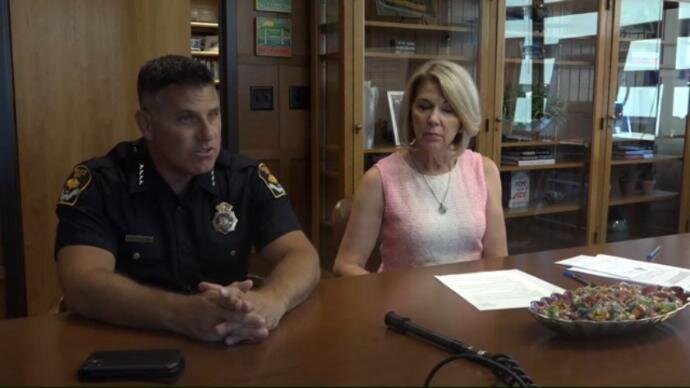City of Omaha announces changes for use of force and diversity, Community wants Accountability
By Samantha Aguilar
Mayor Jean Stothert announced Thursday, June 25 plans to revise the Omaha Police Department’s “Use of Force Policy”, as well as implement diversity and inclusion initiatives throughout the city government.
Omaha Police Chief Todd Schmaderer talks about OPD policy changes on Thursday afternoon, June 25, 2020, as Mayor Jean Stothert listens. Police policy changes were announced earlier in the day. (WOWT)
The changes brought about by Omaha Police Chief, Todd Schmaderer, include adding knee to neck pins to the list of banned tactics that already includes chokeholds.
The existing ban on chokeholds refers to tactics restricting airflow. Another maneuver called the Carotid Restraint Control Hold (CRCH), only restricts blood flow and is still allowed. According to the newly announced changes a CRCH can only be used, if an officer is attacked or in response to deadly force.
Precious McKesson, president of the North Omaha Neighborhood Alliance, said the CRCH needs to be banned completely because officers can claim they used it out of fear for their life.
Following Schmaderer’s changes, it will also be emphasized to officers that being in a prone position (lying on one’s stomach) for extended periods of time can be dangerous, so people should be moved out of prone position as soon as possible.
The statement from the Mayor's office also included initial steps to improve diversity and inclusion in city government including mandatory bias training for all city employees and expanding diversity on city boards and commissions as well as police and fire departments.
“I do want city government to be transparent. I want us to be accountable and I want us to increase in our training,” Stothert said in an interview with KETV Thursday. “My goal is to make a very good police department even better.”
Reform within Omaha Police Department echoes what many congressional democrats are currently calling for in the wake of national protests against police violence.
Presidential candidate Joe Biden called for allocating $300 million toward community policing in his criminal justice plan but many activists say police reform is not enough.
They are instead calling on officials to defund or dismantle police departments citing the lack of consequences police often face for violence even after implicit-bias training and alterations to use-of-force policies have been implemented.
Omaha City Councilman Ben Gray told KETV although he has heard calls to reallocate some funds from the OPD’s budget to the community, there’s only a small percentage of funding that could be moved.
Minneapolis was one of six cities chosen by Obama’s Department of Justice in 2015 to take part in a three-year, $4.75 million project to pilot a new kind of policing that included body cameras, implicit bias training, and “racial reconciliation.” But the Minneapolis Police Department failed to remove Derek Chauvin from the force despite 17 misconduct complaints. Growing skepticism of police agencies investigating killings by their own officers has led to many cities including Los Angeles to yield responsibility to task forces in an effort to increase accountability.
Precious McKesson and Omaha activist and program director at Weitz Family Foundation, Ja Keen Fox, told KETV accountability is what the policy changes are currently missing. They want to get rid of qualified immunity so officers know that breaking the new rules will result in punishment.
As part of Mayor Stothert’s revision to the 2014 Executive Order that created the Citizen Complaint Review Board, citizens will be able to file complaints against officers directly with the CCRB. This is in contrast to current practice, where such complaints are currently filed with Internal Affairs. However, the initial investigation into those officers will continue to be conducted by Internal Affairs and will be followed by a review by the Chief of Police.
A review of recent protests in Omaha and the police response will be conducted by the Police Chief and presented to Mayor Stothert and the City Council.

